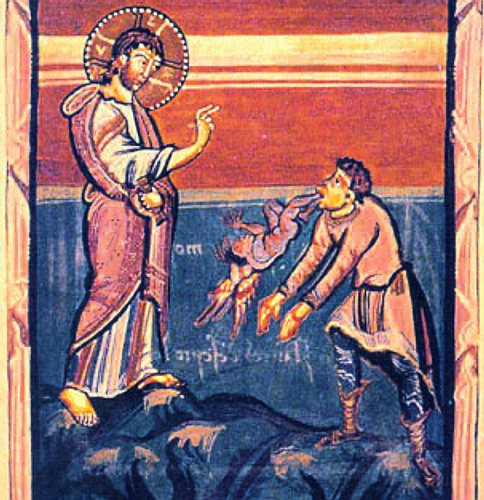As he stepped out on land, a man of the city who had demons met him. For a long time he had worn no clothes, and he did not live in a house but in the tombs.I hope that wasn't too long. The story is told by Mark and Matthew as well, and although there are variances in Matthew, the story is basically the same. Do you notice anything missing in this account?
28 When he saw Jesus, he fell down before him and shouted at the top of his voice, "What have you to do with me, Jesus, Son of the Most High God? I beg you, do not torment me"-- 29 for Jesus had commanded the unclean spirit to come out of the man. (For many times it had seized him; he was kept under guard and bound with chains and shackles, but he would break the bonds and be driven by the demon into the wilds.) 30 Jesus then asked him, "What is your name?" He said, "Legion"; for many demons had entered him.
31 They begged him not to order them to go back into the abyss. 32 Now there on the hillside a large herd of swine was feeding; and the demons begged Jesus to let them enter these. So he gave them permission. 33 Then the demons came out of the man and entered the swine, and the herd rushed down the steep bank into the lake and was drowned.
34 When the swineherds saw what had happened, they ran off and told it in the city and in the country. 35 Then people came out to see what had happened, and when they came to Jesus, they found the man from whom the demons had gone sitting at the feet of Jesus, clothed and in his right mind. And they were afraid. 36 Those who had seen it told them how the one who had been possessed by demons had been healed. 37 Then all the people of the surrounding country of the Gerasenes asked Jesus to leave them; for they were seized with great fear. So he got into the boat and returned.
38 The man from whom the demons had gone begged that he might be with him; but Jesus sent him away, saying, 39 "Return to your home, and declare how much God has done for you." So he went away, proclaiming throughout the city how much Jesus had done for him.
Come on, folks! You've been watching your horror movies. You've seen your television shows, like "Supernatural." Where is the war? This is the only actual dialog between Jesus and a demon in the Bible, and the demons aren't hollering defiance and war. They are not vowing revenge. What else is missing? Here is a man possessed by many, many demons -- enough to take out a herd of swine -- and he can break chains, so you'd figure that he could do some serious damage to the village, right?
This is strange.
 If you want a Left Behind "Rapture Ranger" going to war with your Christian soldiers and counting on the Mighty Fortress that is our Lord, then this story is frustrating in every possible way. The demons manifest their evil by making their victim hurt himself. They show that they are demonic by being remorseful and despairing. They do not fight Christ. Instead, their first reaction is to ask if He has come to give them their torment in advance, because they know that the torment is coming. In other words, they are fully conscious of their guilt, and they are fully conscious of the fact that they not only will lose the struggle, but that they should lose the struggle.
If you want a Left Behind "Rapture Ranger" going to war with your Christian soldiers and counting on the Mighty Fortress that is our Lord, then this story is frustrating in every possible way. The demons manifest their evil by making their victim hurt himself. They show that they are demonic by being remorseful and despairing. They do not fight Christ. Instead, their first reaction is to ask if He has come to give them their torment in advance, because they know that the torment is coming. In other words, they are fully conscious of their guilt, and they are fully conscious of the fact that they not only will lose the struggle, but that they should lose the struggle.What do they do when Jesus sends them into the swine? The compel the swine to drown themselves.
"Legion" is despair. The man with these demons suffers exactly as a person would who has the more malignant form of the disease depression.
This tells us enormous amounts about "demons," and despair. An animal, a pig, that held human despair would charge off a cliff. It could not endure the suffering. A man, imbued with reason, would instead harm himself. His elevation above the animal means a greater capacity for suffering because of consciousness, because of futurity, responsibility, and morality.
If you wish to see the story of the possession as a metaphor, as many no doubt do, then, just as other "demons" were epilepsy, this "demon" is our Scriptural evidence of depression. The man possessed by Legion is the patron saint, more or less, of those who suffer despair. The disease, when it comes from disease and not events, is like a herd of maledicting spirits: each voice speaks ill of every event, or even every lack of event. Each night is spent with a foreign, invading spirit turning the resting mind to whatever thought is most ill to the sleeper, and every morning sun is cast over by the clouding demon that calls it too hot or too late or too early, and the ledger is kept by demons that only know debits against the account.
The man who dwelt among the tombs was afflicted by the army of evil despair, and so there was not one thing to remove. Had his friends told him that the day was fine, the next spirit would have said, "Yes, but I have accomplished nothing in it." Had a loved one pointed to all that he did, the next voice would have said, "But it is too late to do any good for anyone." Like poisonous mercury, it would fracture and reassemble with one effect but as many bodies as necessary.
I only saw this meaning in the story this week. You may not think the story illustrates despair, but you cannot evade the despair of the demons. Frozen monks speculating on spiritual warfare are finely metaphorical, but this is Gospel, and we do well to consider it first, and those people who have a vested interest in war metaphors in their religion need to find some justification for it. Jesus won that fight already, but we can lose it all with violence, civil war, hate, and despair.
